Sweet potato rolls are light, fluffy, and delightfully tender! They are made with classic dinner roll ingredients and sweet potato puree, giving a traditional recipe additional flavor and warmth.
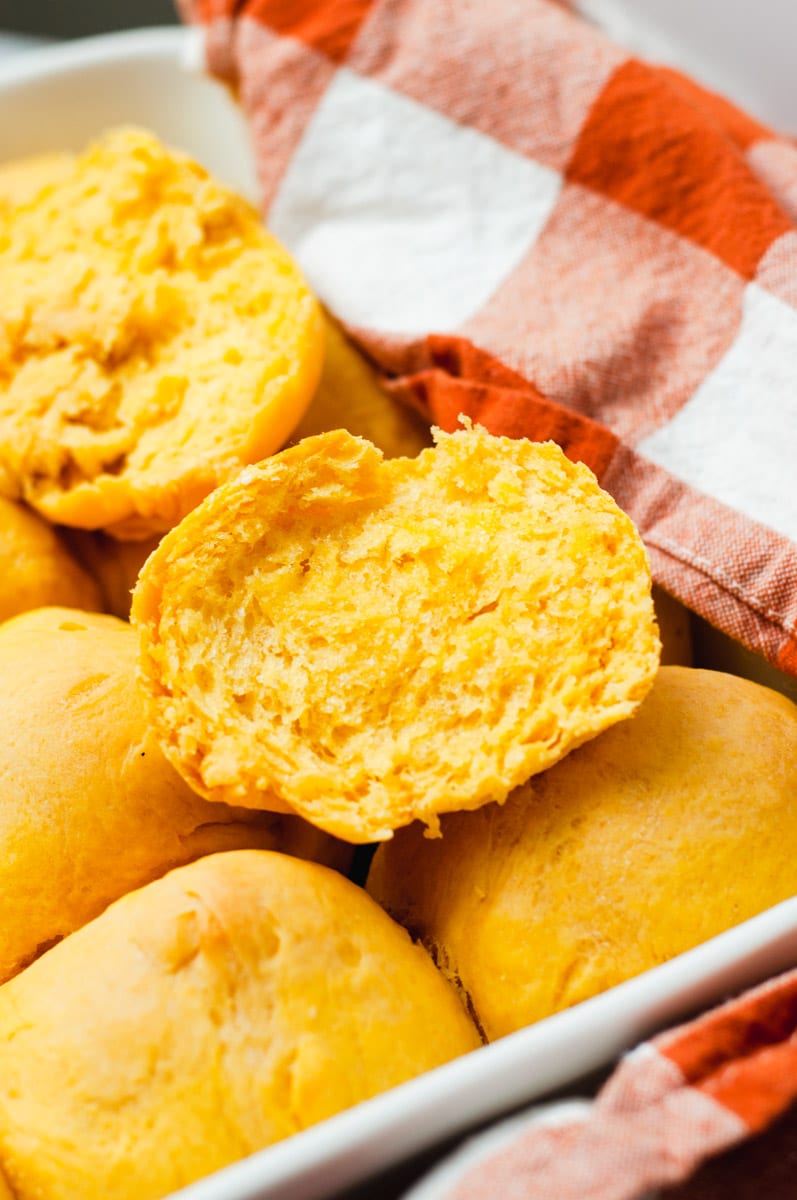
What better time than Mid-November to introduce you to this new sweet potato recipe?
These sweet potato rolls are holiday season-approved and will certainly be on my Thanksgiving menu this year, alongside other favorites like garlic cream cheese mashed potatoes, sourdough stuffing, and gouda mac and cheese.
Classic dinner rolls (like my yeast dinner rolls) are all well and good, but there is something so comforting about a sweet, cinnamony, and buttery sweet potato roll.
Jump to:
Why this recipe works
- Ultra-soft: Sweet potato rolls have a soft, tender, and buttery texture just like a classic dinner roll. Adding potato to rolls actually makes rolls more tender because of their high starch content.
- On the sweet side: But not too sweet! The natural sweetness from baked sweet potato is paired with light brown sugar and cinnamon for a warming, but not overpowering fall flavor.
- Perfect as a Thanksgiving side: Make the sweet potato rolls in advance for an easy side to serve at Thanksgiving or other holidays.
- Baked sweet potato: This recipe uses a baked sweet potato because baking sweet potatoes enhance their natural sweetness. However, it does work with canned sweet potato puree if you're looking to cut down on prep time.
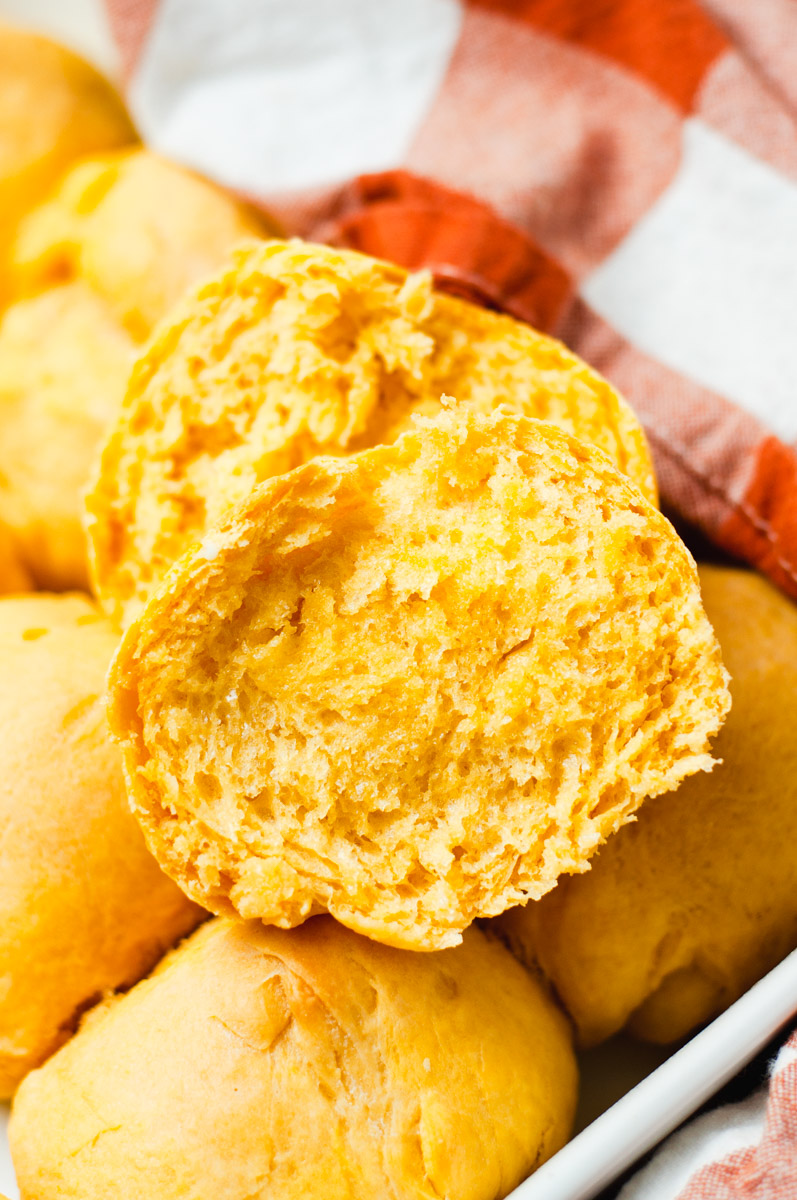
Ingredients
To make these rolls you will need a few traditional ingredients:
- Sweet potato: Choose a Jewel or Garnet sweet potato. Those have orange/red flesh. White and Japanese sweet potatoes do not work in this recipe. Canned sweet potato puree also works. One medium to large sweet potato yields about 1 cup of pureed sweet potato.
- Active dry yeast: This recipe has not been tested with instant yeast, but it should work. Instant yeast just activates more quickly than active yeast.
- All-purpose flour yields a tender dinner roll. Don't use bread flour or cake flour here.
- Light brown sugar adds light and caramel-y sweetness. Dark brown sugar or white sugar will work in a pinch.
- Milk: 2% is my go-to but any kind will work.
- Unsalted butter: If using salted butter, I recommend cutting the table salt used in the recipe by half.
Step-by-step instructions
Author's note: Don't be intimidated by the long list of instructions. Sweet potato dinner rolls are simple to make once you get comfortable working with dough.
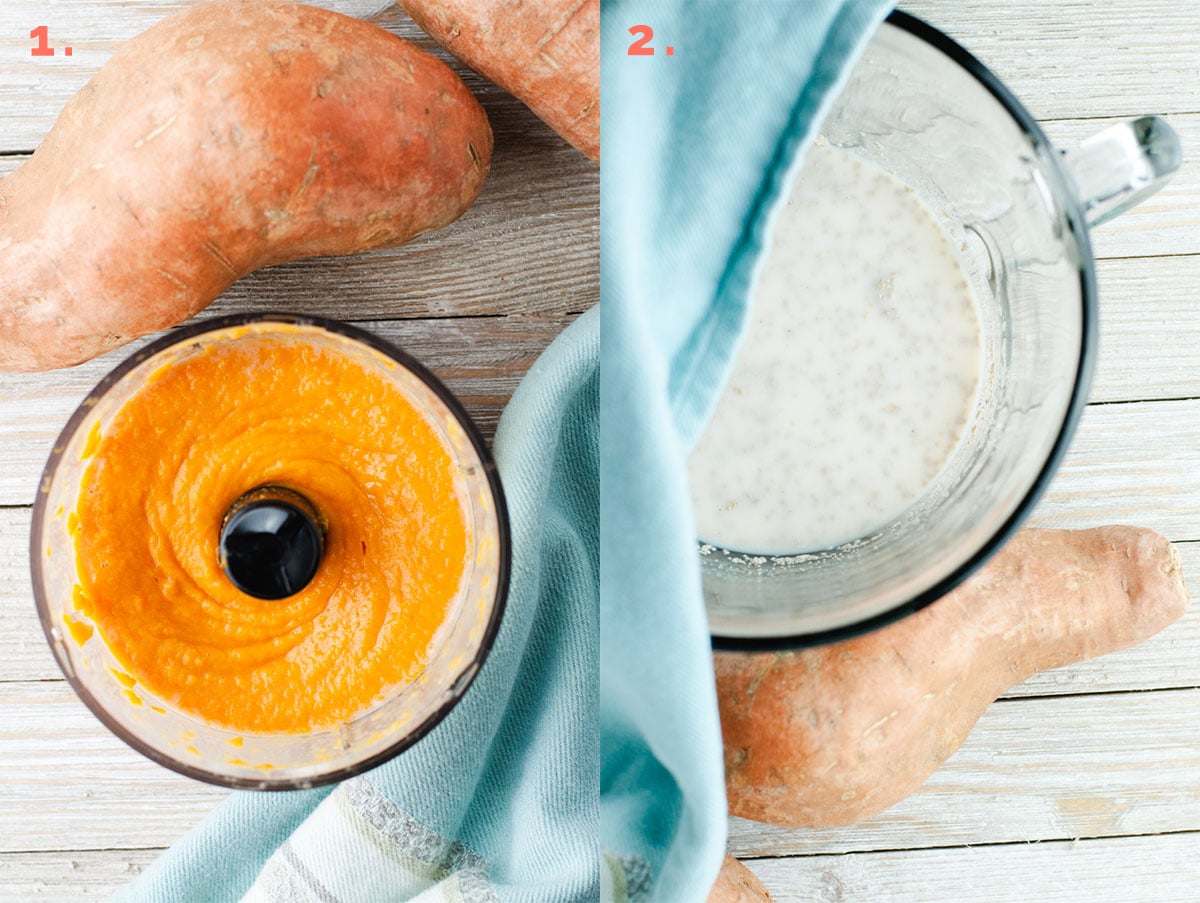
Step one: If making your own sweet potato puree using baked sweet potato, add ¾ cup of the baked sweet potato and ¼ cup of warm milk to a blender or food processor. Blend until pureed.
Step two: Add ¾ cup of warm milk to a large mixing bowl. If you did not puree the sweet potato with milk, use 1 cup of warm milk here. Sprinkle with active dry yeast. Cover with a dish towel or plastic wrap and let proof for 10 minutes.
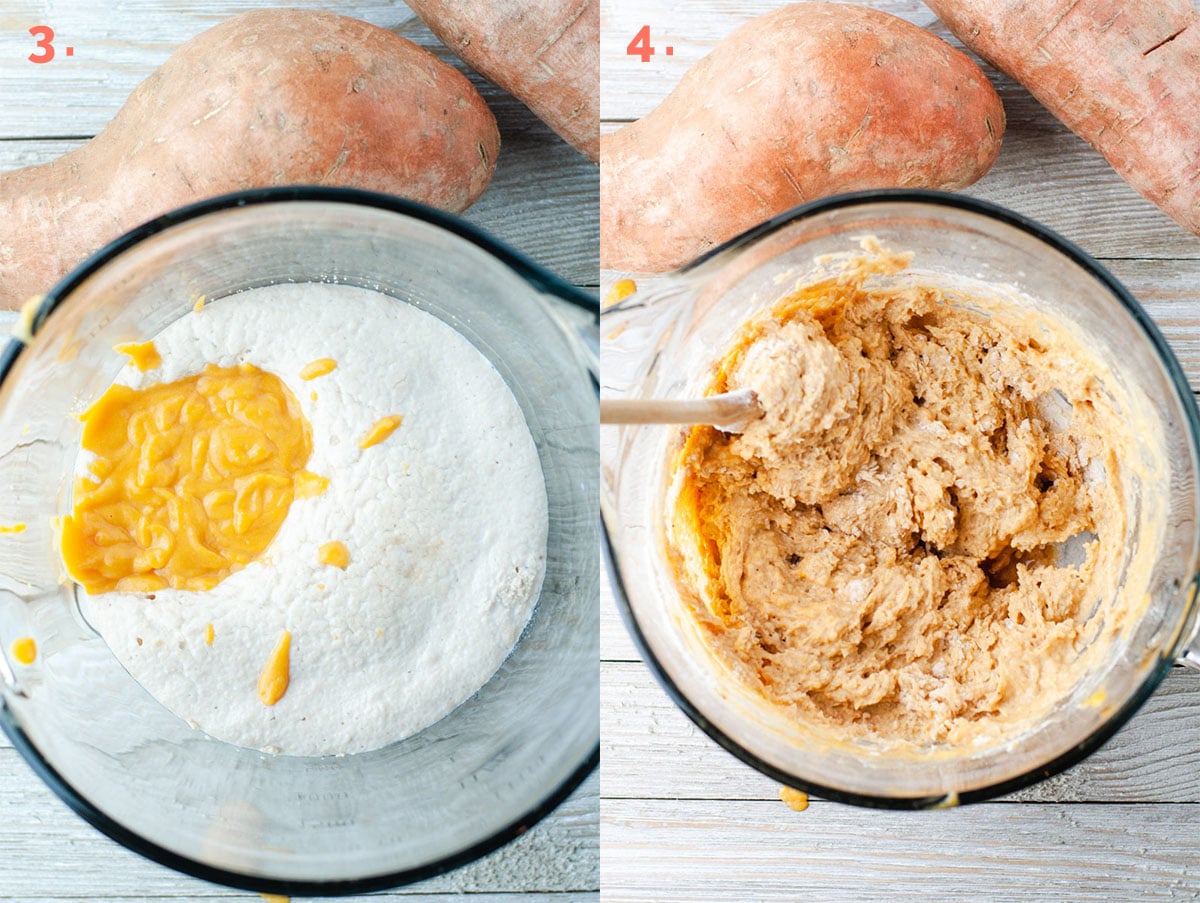
Step three: When the yeast is bubbling, stir in the sweet potato puree, brown sugar, cinnamon, melted butter, and salt.
Step four: Using a large spoon or stand mixer, stir in ½ cup flour at a time. Add flour until the dough is just holding together.
Step five (not pictured): If kneading by hand, sprinkle a clean surface with flour. Knead the dough until smooth and elastic, about 8-10 minutes.
See below for dough kneading tips. If using a stand mixer, set your stand mixer to low and work until the dough is smooth and elastic, about 4 to 6 minutes.
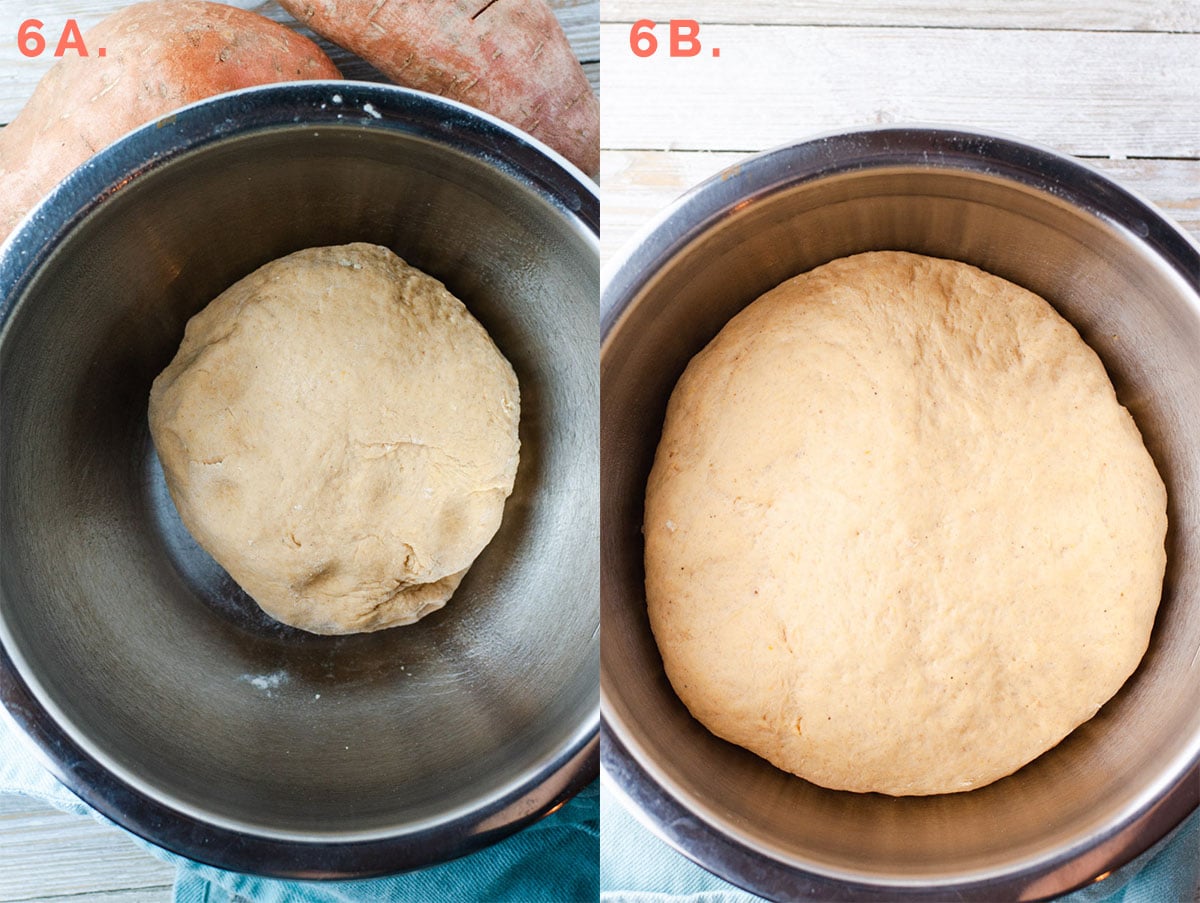
Step six: Lightly oil a large mixing bowl with canola oil. Add the dough, flipping to grease. Cover lightly with plastic wrap or a towel and set in a warm place. Let rise until doubled in size (step 6b), about an hour.
Step seven: Once doubled in size, use your fist to deflate the dough. Knead lightly a few times to fully deflate.
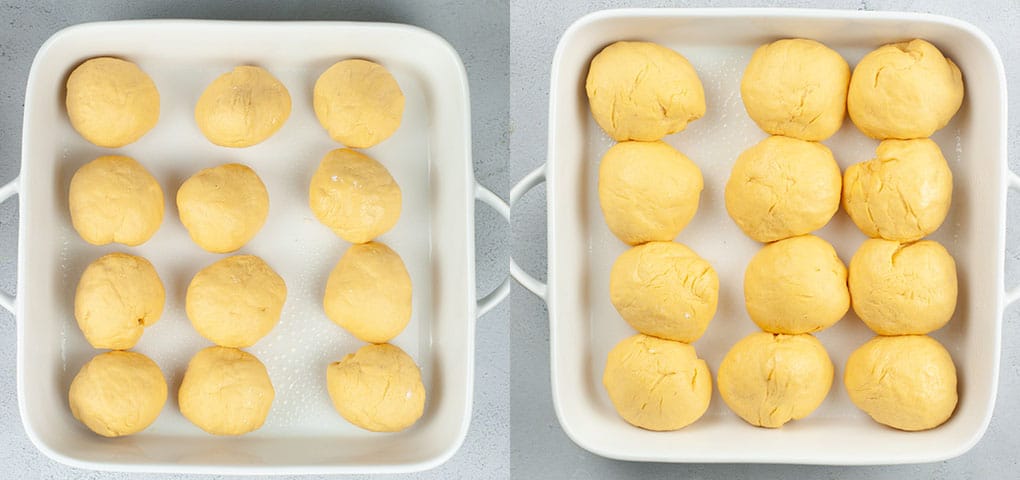
Step eight: To make the rolls, divide the dough into four equally sized pieces. You can guess or use a kitchen scale. Divide each of these pieces into three so that you have a total of 12 pieces of dough. To form into a ball, cup each piece lightly in your palms and roll into a ball.
Step nine: Line the twelve rolls evenly in a lightly oiled 10x10- or 9x13-inch baking dish. Cover and let rise in a warm place until double in size, about 20 minutes. Meanwhile, preheat the oven to 350 degrees F.
Step ten: Brush the tops of the rolls with melted butter for a tender roll. Bake at 350 degrees for 15-18 minutes, or until the tops are lightly golden.
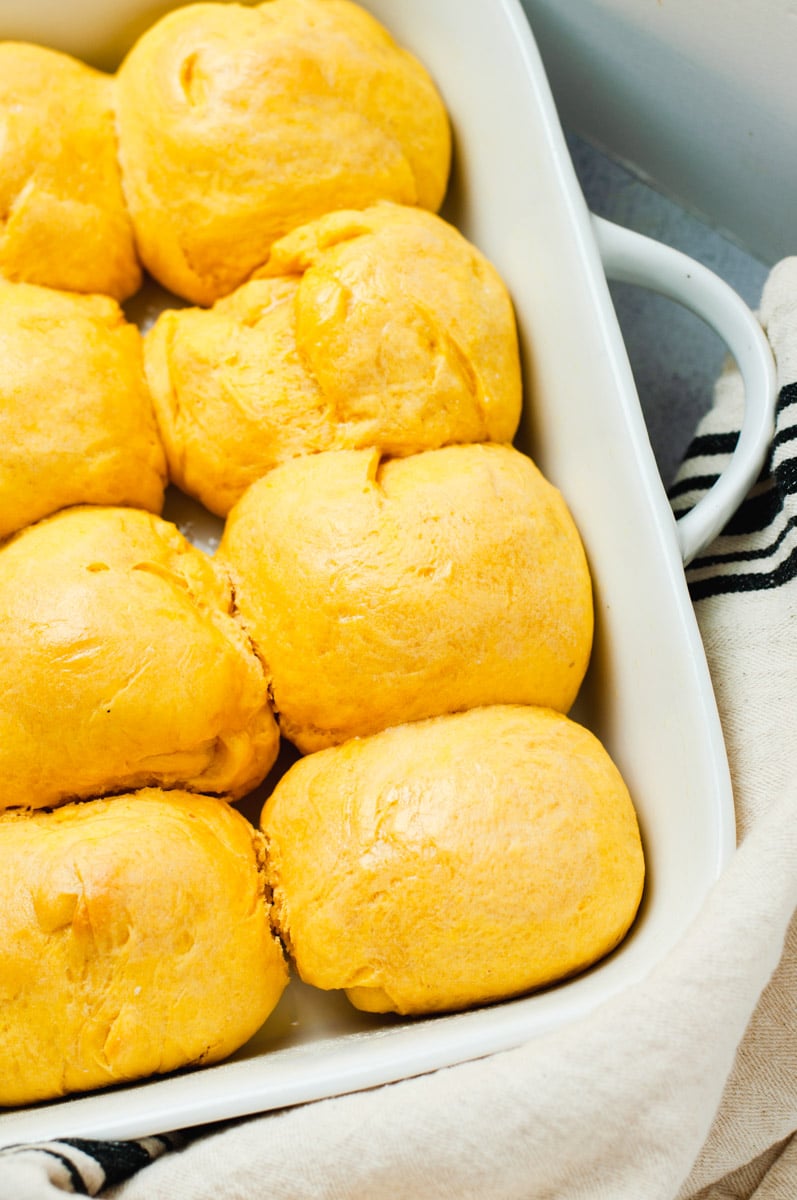
Dough kneading tips
- To avoid using too much flour, spoon flour into a measuring cup instead of dipping the measuring cup into the flour bag. Use the back of a knife to scrape excess flour off of the measuring cup. Even better, use gram weights to measure out flour. One cup of all-purpose flour is 120 grams.
- If the sweet potato roll dough is too wet while kneading, add additional flour ¼ cup at a time.
- If the dough becomes too dry, add milk 1 tablespoon at a time while kneading. It will be sticky at first but as you work the dough it will get less dry.
- New to kneading? America's Test Kitchen has a great step-by-step tutorial on how to knead dough.
Expert tips
- How to bake a sweet potato: Poke a few holes in a medium sweet potato. Place on a piece of foil or sheet pan and roast at 400F for 45-60 minutes, until very tender. Juices should be coming out of the holes and it should be very easy to poke the sweet potato with a knife. Bake time will vary based on the sweet potato size.
- For a heartier roll, use half all-purpose and half whole wheat flour.
- Make these sweet potato rolls savory by omitting the cinnamon and replacing it with roasted garlic and rosemary. Use regular sugar in place of table sugar for a more neutral flavor.
- Canned sweet potato puree: This does work in place of using a baked sweet potato. Note that canned sweet potato tends to be wetter, so you may need to add extra flour during the kneading process.
FAQ
Make vegan/dairy-free sweet potato rolls by swapping out cow's milk for neutral non-dairy milk like unsweetened, unflavored soy milk, or oat milk. Use vegan butter in place of traditional butter. Earth Balance buttery sticks are my favorite for baking.
These rolls make the perfect side at a potluck, but they're also great with weeknight dinners like instant pot quinoa chili, vegetarian chili mac or vegan broccoli mac and cheese. They also go well with soup. My personal favorites to pair these with are Instant Pot lentil stew or Instant Pot vegan white bean soup.
Transfer frozen or room temperature rolls to a baking dish and cover in foil, or wrap them in foil. Bake at 325F for just 10 to 15 minutes to warm the rolls.
Recommended baking tools
You don't need fancy tools to make sweet potato rolls, but I have found that using these gadgets makes the experience more enjoyable and easier.
- A large mixing bowl. Even better, a stand mixer with a large mixing bowl. I use my grandma's old Kitchenaid stand mixer, which is a tried and true brand.
- Digital food scale for creating equally sized rolls (this is the one that I use)
- Digital food thermometer for testing the temperature of the milk and butter
- When kneading by hand, I knead the dough on this baking mat to cut down on counter-top cleanup
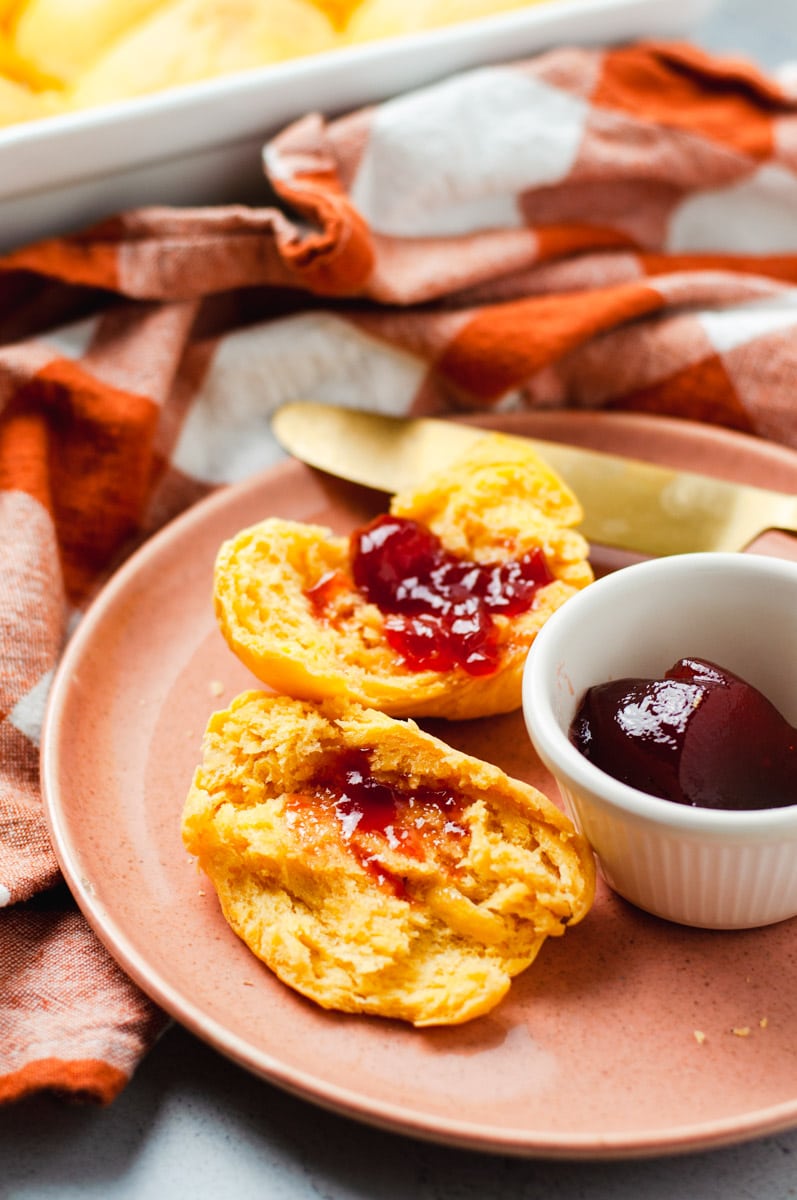
Storage tips
Leftovers: Dinner rolls are best within 2 to 3 days because they dry out relatively quickly. Store covered at room temperature, because they will dry out more quickly in the fridge.
Freezing: The rolls can be frozen after baking them. Let cool to room temperature before freezing in an airtight container for up to 3 months. Let thaw overnight at room temperature or pop in the microwave to reheat.
Looking for similar recipes?
Did you try this recipe? You can leave a star rating in the recipe card or a review in the comments below. Or check out my new cookbook and keep up to date with my YouTube, Instagram, TikTok, or newsletter!
📖 Recipe
Want to Save This Recipe?
Enter your email & I'll send it to your inbox. Plus, get great new recipes from me every week!
By submitting this form, you consent to receive emails from Cozy Peach Kitchen
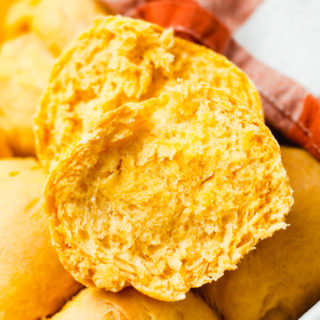
Sweet Potato Dinner Rolls
Ingredients
- ¾ cup sweet potato puree see note
- 1 cup milk 108-110 degrees F
- 1 packet active dry yeast
- ¼ cup + 2 tablespoons melted butter divided
- 3 tablespoons light brown sugar
- 1 teaspoon cinnamon
- ½ teaspoon salt
- 3-4 cups all-purpose flour more as needed
Instructions
- If making your own sweet potato puree, add ¾ cup of roasted sweet potato (skin removed) and ¼ cup of warm milk to a blender or food processor. Blend until smooth and pureed.
- Add ¾ cup of warm milk to a large mixing bowl. Sprinkle with active dry yeast.
- Cover with a dish towel or plastic wrap and let proof for 10 minutes.
- When the yeast is foamy, stir in the sweet potato puree, ¼ cup melted butter, brown sugar, cinnamon and salt.
- Using a wooden spoon or stand mixer, add flour ½ cup at a time. Mix in flour until the dough is just holding together. If kneading by hand, sprinkle a clean surface with flour. Knead the dough until smooth and elastic, about 8-10 minutes. If using a stand mixer, set to low and knead until the dough is smooth and elastic, about 2-3 minutes.
- Lightly oil a large mixing bowl with cooking oil. Add the dough, flipping to coat with oil. Cover tightly with plastic wrap or a towel and set in a warm place. Let rise until doubled in size, about an hour.
- Once doubled in size, use your fist to deflate the dough. Knead lightly a few times to fully deflate. To make the rolls, divide the dough into four equally sized pieces. Divide each of these pieces into three so that you have a total of 12 equally sized pieces of dough. To form into a ball, cup each piece lightly in your palms and roll.
- Lightly oil a 10x10 or 9x13 baking dish. Evenly space the 12 rolls in the dish. Cover and let rise in a warm place until double in size, about 20-30 minutes.
- Meanwhile, preheat the oven to 350 degrees F.
- Once doubled in size, brush the rolls with 2 tablespoons melted butter. Bake at 350 degrees for 15-18 minutes, or until the tops are lightly golden.
Notes
- Warm milk in the microwave until 108-110 degrees F. Use a food thermometer to check the temperature.
- Use a total of 1 cup of milk in this recipe. If you don't make your own sweet potato puree you will stir 1 cup of milk with the yeast instead of ¾ cup milk.
- 1 packet active dry yeast = 2 and ¼ teaspoons yeast.
- I recommend using a kitchen thermometer to temp your milk and butter after heating. You want the milk to be between 108-110 degrees; any warmer may kill the yeast and cooler may prevent the yeast from activating. Temp the butter to make sure that it isn't over 110 degrees (this may scald the yeast).
- Yeast dough rises best in a warm environment. If your kitchen is cold (less than 75 degrees), set your oven to the lowest temp (180-200 degrees). Once heated, turn the oven off and place the dough in the closed (and off) oven to rise.
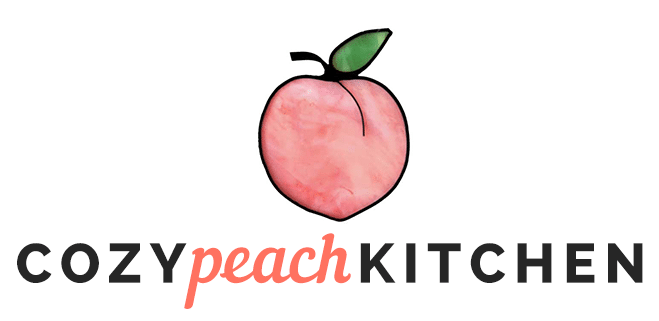




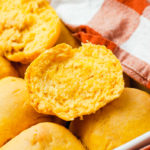
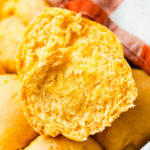
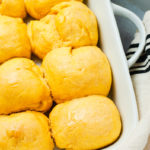

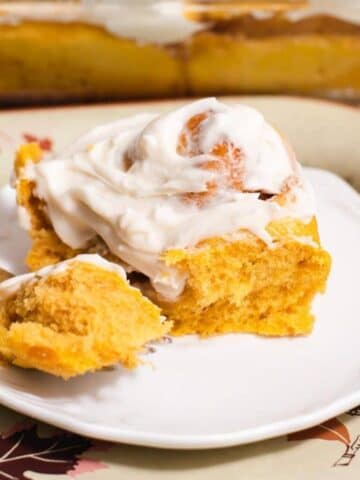
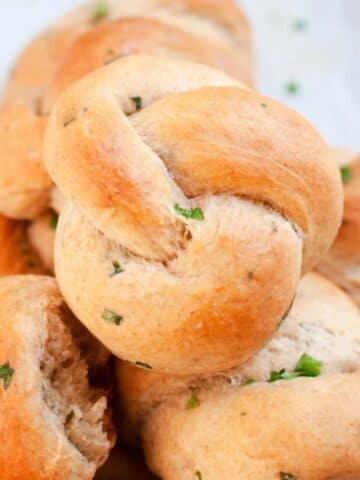
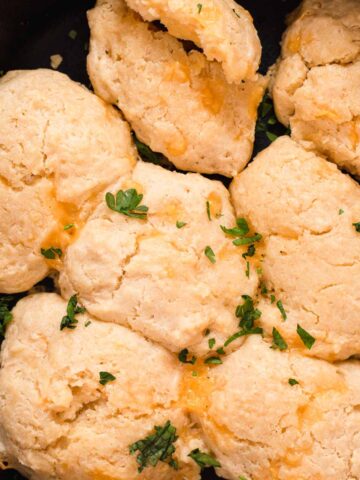
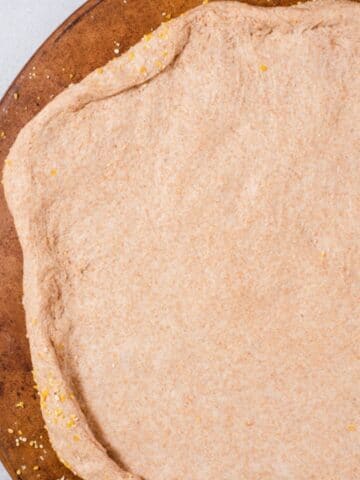
Comments
No Comments